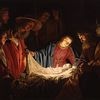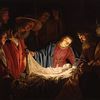3.3.2015 | 14:29
Heilaþvottur fjölmiðla
Þegar fólk er búið að lesa í áratugi hluti eins og þessa frétt þar sem staðhæft er um hve gamalt eitthvað er og hvernig eitthvað varð til þá getur orðið erfitt að einu sinni greina að hérna er ekki um staðreyndir að ræða heldur ályktanir byggðar sem oft eru byggðar á ákveðni hugmyndafræði. Við sjáum þetta í allt of mörgum málefnum, í staðinn fyrir að segja fréttir þá er gengið út frá ákveðni niðurstöðu og jafnvel reynt að gera lítið úr þeim sem hafa aðra skoðun. Það er engan veginn hlutverk fréttamiðla að mínu mati.
Fyrir þá sem langar að sjá hvernig sköpunarsinnar sjá þessa áhugaverðu uppgvötun, sjá: https://creation.com/images/pdfs/tj/j22_2/j22_2_11-12.pdf

|
Bráðþroska vetrarbraut í ungum alheimi |
| Tilkynna um óviðeigandi tengingu við frétt | |
Vísindi og fræði | Breytt s.d. kl. 14:30 | Slóð | Facebook | Athugasemdir (0)
2.3.2015 | 16:02
Smá gagnrýni á trúboða Þróunarkenningarinnar
 Það er búið að vera hellings vinna fyrir sköpunarsinna að leiðrétta allan þann misskilning sem Neil deGrasse hefur orsakað með sínum þáttum. Það sem sést þegar það sem Neil deGrasse segir er að hann er trúboði fyrir efnishyggju og darwinisma. Að endurtaka það sem Carl Sagan boðaði "The Cosmos is all that is or was or ever will be". Að vísu þá endurtekur Neil deGrasse aðeins þann hluta að guðleysi er hið sama og vísindi því að Neil deGrasse boðar "multi-verse" hugmyndina í sínum þáttum, þ.e.a.s. að það eru til margir alheimar. Hugmyndin sem var fundin upp til að svara þeirri staðreynd að náttúrulögmálin lýta út fyrir að vera fínstillt fyrir náttúruna.
Það er búið að vera hellings vinna fyrir sköpunarsinna að leiðrétta allan þann misskilning sem Neil deGrasse hefur orsakað með sínum þáttum. Það sem sést þegar það sem Neil deGrasse segir er að hann er trúboði fyrir efnishyggju og darwinisma. Að endurtaka það sem Carl Sagan boðaði "The Cosmos is all that is or was or ever will be". Að vísu þá endurtekur Neil deGrasse aðeins þann hluta að guðleysi er hið sama og vísindi því að Neil deGrasse boðar "multi-verse" hugmyndina í sínum þáttum, þ.e.a.s. að það eru til margir alheimar. Hugmyndin sem var fundin upp til að svara þeirri staðreynd að náttúrulögmálin lýta út fyrir að vera fínstillt fyrir náttúruna.
Fyrir þá sem hafa horft á þættina en vilja greiða úr flækjunum og staðreyndavillunum þá eru hérna tveir greinar sem fara yfir þær:
Nothing new under the Cosmos - Neil deGrasse Tyson pushes atheism like his mentor Carl Sagan
Cosmos by Neil deGrasse Tyson - Episode 2: “Some of the things that molecules do”

|
Heiðraður fyrir vísindamiðlun |
| Tilkynna um óviðeigandi tengingu við frétt | |
1.3.2015 | 13:16
Fjallar Daníel 8 um Róm eða Antiochus IV Epiphanes?
Hérna er stúdering þar ég skoða hvort að Daníel 8 lýsir gríska konunginum Antiochus IV Epiphanes eða hvort að valdið sem um ræðir er Róm. Inn í þessa umræðu blandast líka Daníel 11 en það er alveg sér stúdering út af fyrir sig. Þar sem megnið af hinum kristna heimi telur að Daníel 8 og Daníel 11 fjalla um Antiochus IV Epiphanes þá leit þetta út fyrir að vera verðugt verkefni að bera þessar tvær útskýringar saman, hlið við hlið.
Daniel 7 | Daniel 8 |
| |
Dan 7:2 Daniel spake and said, I saw in my vision by night, and, behold, the four winds of the heaven strove upon the great sea. Dan 7:3 And four great beasts came up from the sea, diverse one from another. Dan 7:4 The first was like a lion, and had eagle's wings: I beheld till the wings thereof were plucked, and it was lifted up from the earth, and made stand upon the feet as a man, and a man's heart was given to it. Dan 7:5 And behold another beast, a second, like to a bear, and it raised up itself on one side, and it had three ribs in the mouth of it between the teeth of it: and they said thus unto it, Arise, devour much flesh. Dan 7:6 After this I beheld, and lo another, like a leopard, which had upon the back of it four wings of a fowl; the beast had also four heads; and dominion was given to it. … | Dan 8:20 The ram which thou sawest having two horns are the kings of Media and Persia. Dan 8:21 And the rough goat is the king of Grecia: and the great horn that is between his eyes is the first king. Dan 8:22 Now that being broken, whereas four stood up for it, four kingdoms shall stand up out of the nation, but not in his power. Dan 8:23 And in the latter time of their kingdom, when the transgressors are come to the full, a king of fierce countenance, and understanding dark sentences, shall stand up.
| Here we have the time foundation for both the little horn of Daniel 7 and Daniel 8. The order in both chapters is the same:
| |
Daniel 7 1. Babylon 2. Meda Persia 3. Greece 4. Rome – little horn appears as part of Rome | Daniel 8 1. 2. Meda Persia 3. Greece 4. Now the little horn appears
| ||
Here we are going to compare the little horn of Daniel 7 to the little horn in Daniel 8. | |||
Dan 7:7 After this I saw in the night visions, and behold a fourth beast, dreadful and terrible, and strong exceedingly; and it had great iron teeth: it devoured and brakes in pieces, and stamped the residue with the feet of it: and it was diverse from all the beasts that were before it; and it had ten horns. Dan 7:8 I considered the horns, and, behold, there came up among them another little horn, before whom there were three of the first horns plucked up by the roots: and, behold, in this horn were eyes like the eyes of man, and a mouth speaking great things. Dan 7:9 I beheld till the thrones were cast down, and the Ancient of days did sit, whose garment was white as snow, and the hair of his head like the pure wool: his throne was like the fiery flame, and his wheels as burning fire. … Dan 7:20 And of the ten horns that were in his head, and of the other which came up, and before whom three fell; even of that horn that had eyes, and a mouth that spake very great things, whose look was more stout than his fellows. Dan 7:21 I beheld, and the same horn made war with the saints, and prevailed against them; Dan 7:22 Until the Ancient of days came, and judgment was given to the saints of the most High; and the time came that the saints possessed the kingdom. Dan 7:23 Thus he said, The fourth beast shall be the fourth kingdom upon earth, which shall be diverse from all kingdoms, and shall devour the whole earth, and shall tread it down, and break it in pieces. Dan 7:24 And the ten horns out of this kingdom are ten kings that shall arise: and another shall rise after them; and he shall be diverse from the first, and he shall subdue three kings. Dan 7:25 And he shall speak great words against the most High, and shall wear out the saints of the most High, and think to change times and laws: and they shall be given into his hand until a time and times and the dividing of time. Dan 7:26 But the judgment shall sit, and they shall take away his dominion, to consume and to destroy it unto the end.
| Dan 8:9 And out of one of them came forth a little horn, which waxed exceeding great, toward the south, and toward the east, and toward the pleasant land. Dan 8:10 And it waxed great, even to the host of heaven; and it cast down some of the host and of the stars to the ground, and stamped upon them. Dan 8:11 Yea, he magnified himself even to the prince of the host, and by him the daily sacrifice was taken away, and the place of his sanctuary was cast down. Dan 8:12 And an host was given him against the daily sacrifice by reason of transgression, and it cast down the truth to the ground; and it practised, and prospered. Dan 8:23 And in the latter time of their kingdom, when the transgressors are come to the full, a king of fierce countenance, and understanding dark sentences, shall stand up. Dan 8:24 And his power shall be mighty, but not by his own power: and he shall destroy wonderfully, and shall prosper, and practise, and shall destroy the mighty and the holy people. Dan 8:25 And through his policy also he shall cause craft to prosper in his hand; and he shall magnify himself in his heart, and by peace shall destroy many: he shall also stand up against the Prince of princes; but he shall be broken without hand.
| Shared characteristics
· Both are described as horns (7:8; 8:9) · Both are described as little (7:8; 8:9) · Both become great later on (7:20; 8:9) · Both come after Greece (7:8, 8:9, 8:23) · Both are described as persecuting powers · Both are self-exalting and blasphemous · Both attack the people of God or the saints · Both are the anti-God climax of both visions · Both endure to the end of the world · (7:26; 8:17, 19) · Both are supernaturally destroyed
It’s quite clear that the evidence points very strongly to that the little horn of Daniel 7 is the same power as the little horn in Daniel 8. If that is the case then the little horn in Daniel 8 can’t be Antiochus. There are no differences which are contradictory.
| |
|
|
| |
Antiochus |
| Rome | |
The big question here is where does this power come from which is represented as a little horn. When it comes to the grammar there are two options. Option one is that it comes out of the four horns, option two is that it comes out of one of the four winds of heaven. This means that we cannot be sure, either way. When we analyse the Hebrew and look at the genders of the words then the “them” matches the four winds of heaven but not the four horns or “four notable one’s”. This is explained in more detailed in this article here: Why Antiochus IV is not the little horn of Daniel 8
| Dan 8:7 And I saw him come close unto the ram, and he was moved with choler against him, and smote the ram, and brake his two horns: and there was no power in the ram to stand before him, but he cast him down to the ground, and stamped upon him: and there was none that could deliver the ram out of his hand. Dan 8:8 Therefore the he goat waxed very great: and when he was strong, the great horn was broken; and for it came up four notable ones toward the four winds of heaven. Dan 8:9 And out of one of them came forth a little horn, which waxed exceeding great, toward the south, and toward the east, and toward the pleasant land.
|
| |
|
|
| |
When Daniel talks about Persia and Greece and that they “waxed very great” then we understand that to mean that they conquered lands and became great empires and that fits the history. So, it’s only logical to assume that when Daniel applies that same word, three times to the little horn power it would mean the same thing. If it means the same thing then Antiochus fails the description because his conquests weren’t impressive, he failed when he attacked south towards Egypt, had to turn back after a meeting with a roman diplomat. When he attacked east he died in that campaign. When it comes to the holy land it was already under Antiochus rule when he came into power so that doesn’t match the description as well. | Dan 8:9 And out of one of them came forth a little horn, which waxed exceeding great, toward the south, and toward the east, and toward the pleasant land.
| If the little horn power is Rome then Rome certainly took over Egypt to the South and parts of Africa which are also to the south. Rome also conquered lands to the East and Rome was the power that conquered the Holy Land.
| |
|
|
| |
Here the prophecy talks about the persecution of this little horn power and Antiochus certainly persecuted the Jews. Antiochus polluted the sanctuary by offering pigs and having a statue of Zeus in the temple so in some respects, Antiochus matches that in certain way. But, the prophecy also says that the “sanctuary was cast down” and Antiochus didn’t cast down the sanctuary so he didn’t fulfil that part of the prophecy. | Dan 8:10 And it waxed great, even to the host of heaven; and it cast down some of the host and of the stars to the ground, and stamped upon them. Dan 8:11 Yea, he magnified himself even to the prince of the host, and by him the daily sacrifice was taken away, and the place of his sanctuary was cast down. | If the little horn power is pagan Rome and Christian Rome they both persecuted both Jews and Christians. The pope sets himself up as Jesus Christ on earth and that he can actually tell God what to do. Rome destroyed the sanctuary or Salomon’s temple in 70 A.D. and by doing that it took away the sacrificial system of the Jews. If we look at it from God’s perspective then Rome was the power behind the crucifixion of Jesus which made the sacrificial system obsolete. In both cases, Rome fits perfectly. | |
|
|
| |
Here it depends on how one understands “cast the truth to the ground”. All kinds of heresy had come up in Israel, the kings of Israel many abandoned the law, many started to worship other gods and even brought them into the temple. From that perspective Antiochus didn’t do anything in particular that fulfilled this part of the prophecy. Furthermore, it can’t be said that Antiochus “practiced and prospered”. If he hadn’t desecrated the sanctuary of the Jews it’s hard to imagine any one of us would have heard of him. He would have been just one name in a list of 20 kings of the Seleucid empire who was a bit of a failure.
| Dan 8:12 And an host was given him against the daily sacrifice by reason of transgression, and it cast down the truth to the ground; and it practised, and prospered.
| We live in a time when the truth of Scripture is barely restored in spite of the reforms of the protestant churches through the centuries and this is because of what Rome did right there in 300 A.D. In this respect, Rome cast the truth to the ground. Also, Rome has practiced and prospered for more than a thousand years. A lot was going on in Rome and it went through a lot of hard times but it was amazingly powerful and is even the power that pulls the strings today behind the scenes. | |
|
|
| |
Many have tried to make the 2300 days match Antiochus but they have all failed. For example this article here: http://www.moellerhaus.com/2300.htm
The author tries to make the days fit by using a particular calendar that Herodotus refers to in one of his writings. The problem with that is that no one in history has ever used that calendar and most write it off as a mistake by Herodotus. Everyone who wants to make the days fit Antiochus have to divide the days by two and the reasoning is that the text is referring to the daily sacrifices and there was one morning sacrifice and another evening sacrifice. But the problem with that is that the text only says “daily” and not sacrifice. Most who advocate that Antiochus is the little horn power admit that there is no concrete way to make the days fit the prophecy. So at best we have here a neutral argument for Antiochus to be the little horn power. | Dan 8:13 Then I heard one saint speaking, and another saint said unto that certain saint which spake, How long shall be the vision concerning the daily sacrifice, and the transgression of desolation, to give both the sanctuary and the host to be trodden under foot?
| If we take the start date for the 2300 days from Daniel 9 and use the day for a year principle we come to the year 1844. Then the question arises, did anything interesting happen in 1844? I’d most certainly say yes. Here is a lecture by Walter Veith about this prophecy and he focuses on 1844 and what’s interesting about that year, see: http://amazingdiscoveries.tv/media/145/232-med-1844-and-the-final-onslaught/
| |
|
|
| |
Twice it’s stated that this prophecy is about the days of the end. This point certainly doesn’t fit Antiochus because then the days of the end were hundred years before the birth of Jesus. This should be a major problem for the Antiochus theory because this is what the prophecy in Daniel 8 says it is all about. | Dan 8:15 And it came to pass, when I, even I Daniel, had seen the vision, and sought for the meaning, then, behold, there stood before me as the appearance of a man. Dan 8:16 And I heard a man's voice between the banks of Ulai, which called, and said, Gabriel, make this man to understand the vision. Dan 8:17 So he came near where I stood: and when he came, I was afraid, and fell upon my face: but he said unto me, Understand, O son of man: for at the time of the end shall be the vision. Dan 8:18 Now as he was speaking with me, I was in a deep sleep on my face toward the ground: but he touched me, and set me upright. Dan 8:19 And he said, Behold, I will make thee know what shall be in the last end of the indignation: for at the time appointed the end shall be.
| If the 2300 days are actual years then the prophecy does reach to our times and if Rome is the little horn power it most certainly is one of the major powers of the world today, both when it comes to political power and religious power. | |
|
|
| |
Everywhere I checked this word “akh-ar-eeth” it meant the end of something. Since Antiochus didn’t rule at the end of the four divisions of the Greek empire this fits him quite poorly. “King of fierce countenance” doesn’t seem to fit Antiochus that well. Yes, he was fierce towards the Jews but he run back home with his tail between his legs when he encountering a roman diplomat who tells him to go back home or else. As for “understanding dark sentences” that is not a good fit for Antiochus. “His power shall by mighty… destroy wonderfully and shall prosper and practise”. Compared to Babylon and Persia and Greece then Antiochus can hardly be said to have been very powerful or to have prospered. Greece split into four empires and Antiochus was one of 20 kings in one of those four empires. As for his accomplishments he didn’t accomplish much at all. He persecuted the Jews but those persecutions lead to their independence which they received before Antiochus death so in this respect, Antiochus had power over Israel when he to power but while he was in power, the Jews broke free and earned their independence. | Dan 8:20 The ram which thou sawest having two horns are the kings of Media and Persia. Dan 8:21 And the rough goat is the king of Grecia: and the great horn that is between his eyes is the first king. Dan 8:22 Now that being broken, whereas four stood up for it, four kingdoms shall stand up out of the nation, but not in his power. Dan 8:23 And in the latter time of their kingdom, when the transgressors are come to the full, a king of fierce countenance, and understanding dark sentences, shall stand up. Dan 8:24 And his power shall be mighty, but not by his own power: and he shall destroy wonderfully, and shall prosper, and practise, and shall destroy the mighty and the holy people.
| Rome was already a major player in the days of Antiochus which is clearly seen by the fact that Antiochus retreated from Egypt by a word from a roman diplomat. Now, when the four kingdoms that Greece split into then Rome becomes the new world power so in this respect, Rome really does come up in the “latter time of their kingdom”. King of fierce countenance and understanding dark sentences seems to fit the roman rulers quite well since the papacy is the home of the occult world and the free masonry orders. Rome certainly was mighty and in 70 A.D. they destroyed Jerusalem and the holy temple and killed about 1 million Jews.
| |
|
|
| |
Though a leader of the Jews can possible be considered the prince of princess but it must be said that Jesus fits that description better. „Broken without hand” sounds a lot like Daniel 2 where the stone that destroyed the statue was cut without human hands. Antiochus died without any human interference so in that respect he fits that part. Another thing which is interesting here is that the vision is sealed until the end of days. Like, no one would be able to understand the vision properly until the time of the end which doesn’t fit the Antiochus theory.
| Dan 8:25 And through his policy also he shall cause craft to prosper in his hand; and he shall magnify himself in his heart, and by peace shall destroy many: he shall also stand up against the Prince of princes; but he shall be broken without hand. Dan 8:26 And the vision of the evening and the morning which was told is true: wherefore shut thou up the vision; for it shall be for many days.
| Both the pagan Rome and the Papal Rome grew and prospered. Rome in particular stood and stands against Jesus, both as the power that crucified Him and also as the pope, acting out to be Jesus replacement here on earth who even has the authority to change God’s law. If it’s the Catholic church then it’s a power that is a major player in the last days and maybe one day we will see it being “broken without a hand”.
As for the prophecy being sealed. People didn’t really start to study Daniel until around 1500 and one of the main pillars of the reformation was its study of Daniel and concluding that the Catholic church was the anti-Christ power, the little horn that Daniel prophesied. | |
|
|
| |
Now we come to Daniel 9 but I believe Daniel 9 is a further explanation for the vision that was given in Daniel 8. Here are the reasons for that: 1. In Daniel 9, Gabriel tells Daniel that he has come to explain the vision. From the book, there is only one vision that Gabriel can be referring to and that is the vision in Daniel 8. 2. These chapters may not seem so alike at first but they both state that they are about the sanctuary and when you compare them side by side it seems obvious that they are dealing with the same matter.
If we examine the chapters, side by side then there are a lot of things very similar. "Gabriel make this man to understand the vision."
"The place of his sanctuary was cast down." "By reason of transgression."
"Concerning . . . the transgression of desolation."
"The prince of the host." "At the time of the end shall be the vision." "At the time appointed the end shall be." "Shall destroy the mighty and the holy people."
"Shall stand up against the Prince of princes."
| Dan 9:21 Yea, whiles I was speaking in prayer, even the man Gabriel, whom I had seen in the vision at the beginning, being caused to fly swiftly, touched me about the time of the evening oblation. Dan 9:22 And he informed me, and talked with me, and said, O Daniel, I am now come forth to give thee skill and understanding. Dan 9:23 At the beginning of thy supplications the commandment came forth, and I am come to shew thee; for thou art greatly beloved: therefore understand the matter, and consider the vision.
|
Daniel 9 "He [Gabriel] informed me, "To seal up the vision."
"Shall destroy . . . the sanctuary."
"To finish the transgression… Desolations are determined."
"To bring in everlasting righteousness." "Messiah the Prince."
"Unto the end of the war desolations are determined." "That determined shall be poured upon the desolator"
"Desolate, even till the consummation." "Shall Messiah be cut off." | |
|
|
| |
| Dan 9:23 At the beginning of thy supplications the commandment came forth, and I am come to shew thee; for thou art greatly beloved: therefore understand the matter, and consider the vision. Dan 9:24 Seventy weeks are determined upon thy people and upon thy holy city, to finish the transgression, and to make an end of sins, and to make reconciliation for iniquity, and to bring in everlasting righteousness, and to seal up the vision and prophecy, and to anoint the most Holy.
| I understand that this to mean that there are 70 weeks that are to accomplish the specific things: 1) Finish transgression. In the Old Testament God sometimes talks about a certain nation still having some time left; that the cup of their sins is not yet full. So, to finish the transgression could mean that Israel was about to sin so much that their time was over. 2) To make an end to sin could be a reference to the cross. 3) Eternal justice also sounds like the cross. 4) To anoint the most Holy. If this is a prophecy about the earthly temple then it doesn’t make much sense to me. The reason being that Moses anointed the temple that was built in the wilderness and Salomon anointed the first temple in Jerusalem. Now, if this is a prophecy about the real temple, the temple in heaven then Jesus would have anointed the most Holy with His own blood after the cross. He would have then started his ministry as a high priest in the heavenly temple and we can assume that it would look in some ways like what the earthly priests did here on earth. That would also mean that at some point in time, Jesus would enter the most Holy like the high priest did on the Day of the atonement. | |
|
|
| |
| Dan 9:25 Know therefore and understand, that from the going forth of the commandment to restore and to build Jerusalem unto the Messiah the Prince shall be seven weeks, and threescore and two weeks: the street shall be built again, and the wall, even in troublous times.
| The decree to rebuild Jerusalem was decreed in 457 B.C. There were other decrees but I think this one fits the best. | |
|
|
| |
| Dan 9:26 And after threescore and two weeks shall Messiah be cut off, but not for himself: and the people of the prince that shall come shall destroy the city and the sanctuary; and the end thereof shall be with a flood, and unto the end of the war desolations are determined.
| Amazing that the Jews had it so clearly in their own Scriptures the time of the Messiah’s death and that He was going to be killed but not for Himself. Here we have it specified that people of the prince will destroy the city and the temple and Rome fulfilled that prophecy in 70 A.D. | |
| Dan 9:27 And he shall confirm the covenant with many for one week: and in the midst of the week he shall cause the sacrifice and the oblation to cease, and for the overspreading of abominations he shall make it desolate, even until the consummation, and that determined shall be poured upon the desolate.
| Too complicated for the purpose of this study. Here is a good study on this: http://www.remnantofgod.org/70weeks.htm | |
| Mar_13:14 But when ye shall see the abomination of desolation, spoken of by Daniel the prophet, standing where it ought not, (let him that readeth understand,) then let them that be in Judaea flee to the mountains:
Luk 21:20 And when ye shall see Jerusalem compassed with armies, then know that the desolation thereof is nigh. Luk 21:21 Then let them which are in Judaea flee to the mountains; | Here is something very interesting regarding the “abominations of desolate”. Jesus refers to them specifically and says it’s what Daniel spoke about. We see that in Mark 13:14 and Matthew 24:15. In both those instances it refers to what the Jews would witness just before Jerusalem would be destroyed and they are given the command to flee the city when they see this. Now what’s interesting is that the same warning is given in Luke 21:20 but in that instance its armies surrounding Jerusalem and then its destruction is close at hand. I believe that this means that the “abomination of desolate” are the armies of Rome surrounding Jerusalem or at least was fulfilled when those armies came. After the cross, those armies did surround Jerusalem but for some reason they decided to leave. When this happened Christians believed that the words of Jesus had been fulfilled and they fled the city. A few years later the armies of Rome returned and this time they destroyed the city and the temple, which is exactly what Daniel 9:26 states was going to happen. Of these events one of the early Christian fathers Eusebius wrote: “The whole body, however, of the church at Jerusalem, having been commanded by a divine revelation, given to men of approved piety there before the war, removed from the city, and dwelt at a certain town beyond the Jordan, called Pella”
| |
|
|
| |
Trúmál og siðferði | Breytt 2.3.2015 kl. 16:18 | Slóð | Facebook | Athugasemdir (2)
23.2.2015 | 16:14
Ætli þau séu óhult?
20.2.2015 | 19:10
Ungir múslímar mynda friðarhring um bænahús gyðinga
20.2.2015 | 18:38
Neanderdalsmenn voru menn eins og við
19.2.2015 | 20:26
Á hvaða grundvelli getur fólk sagt að þetta sé rangt?
16.2.2015 | 09:55
Hver er hissa á að hann var múslími?
14.2.2015 | 19:28
Og munurinn á þessu og fóstureyðingu er hver?
9.2.2015 | 23:43
Út frá sköpun þá er ekki þörf á neinu hulduefni
4.2.2015 | 08:41
Hvað með fordóma gagnvart nasistum?
Stjórnmál og samfélag | Breytt s.d. kl. 08:42 | Slóð | Facebook | Athugasemdir (10)
2.2.2015 | 19:17
Stephen fry um karakter Guðs
1.2.2015 | 14:20
Stephen fry um tilvist Guðs
29.1.2015 | 11:56
Eru takmörk fyrir hvað stökkbreytingar geta afrekað?
28.1.2015 | 09:47
Er Ísrael tilraun til annarar helfarar?
24.1.2015 | 23:04
Það er fólk á Íslandi sem vill aðra helför
24.1.2015 | 17:43
Churchill las Mein Kampf
24.1.2015 | 09:42
Trúin betri en einstaklingarnir sem henni fylgja
23.1.2015 | 09:57
Okkar samviska segir til um tilvist Guðs
21.1.2015 | 14:05
Af hverju lifandi steingervingar eru vandamál fyrir Þróunarkenninguna
Um bloggið
Mofa blogg
Færsluflokkar
- Bloggar
- Bækur
- Dægurmál
- Ferðalög
- Fjármál
- Fjölmiðlar
- Heilbrigðismál
- Heimspeki
- Íþróttir
- Kjaramál
- Kvikmyndir
- Lífstíll
- Ljóð
- Löggæsla
- Mannréttindi
- Matur og drykkur
- Menning og listir
- Menntun og skóli
- Samgöngur
- Sjónvarp
- Spaugilegt
- Spil og leikir
- Stjórnmál og samfélag
- Sveitarstjórnarkosningar
- Tónlist
- Trúmál
- Trúmál og siðferði
- Tölvur og tækni
- Umhverfismál
- Utanríkismál/alþjóðamál
- Vefurinn
- Viðskipti og fjármál
- Vinir og fjölskylda
- Vísindi og fræði
Tenglar
Kristnar síður
Ýmislegt
Sköpun/þróun
Síður sem fjalla um sköpun/þróun
- Detecting Design
- UnCommon descent Blogg síða William Dembski um vitræna hönnun
- Creation-Evolution Headlines Síða sem fjallar um fréttir tengdar sköpun þróun
- EvolutionNews Síða sem fjallar um fréttir sem tengjast Vitsmunahönnun
Bloggvinir
- Bergur Thorberg
- Birgirsm
- Brosveitan - Pétur Reynisson
- Bryndís Böðvarsdóttir
- Daníel Þór Þorgrímsson
- Davíð S. Sigurðsson
- Davíð Örn Sveinbjörnsson
- Daði Einarsson
- Dóra litla
- Eva
- Eygló Hjaltalín
- Friðrik Páll Friðriksson
- Georg P Sveinbjörnsson
- Gladius
- Gunnar Ingi Gunnarsson
- Gunnlaugur Halldór Halldórsson
- Guðni Már Henningsson
- Guðrún Sæmundsdóttir
- Guðsteinn Haukur Barkarson
- Gísli Kristjánsson
- Halldóra Hjaltadóttir
- Halldóra Lára Ásgeirsdóttir
- Hjalti Rúnar Ómarsson
- Hörður Finnbogason
- Hörður Halldórsson
- Inga Helgadóttir
- Ingibjörg
- Ingvar Leví Gunnarsson
- Ingvar Valgeirsson
- Janus Hafsteinn Engilbertsson
- Jens Sigurjónsson
- Jóhann Hauksson
- Jóhann Helgason
- Jóhannes Ólafsson Eyfeld
- Jón Hjörleifur Stefánsson
- Jón Ríkharðsson
- Jón Valur Jensson
- Jónatan Gíslason
- Júdas
- Kristin stjórnmálasamtök
- Kristinn Theódórsson
- Kristinn Theódórsson
- Kristinn Ásgrímsson
- Linda
- Mama G
- Morgunstjarnan
- Nonni
- Omnivore
- Predikarinn - Cacoethes scribendi
- Pétur Eyþórsson
- Ragnar Birkir Bjarkarson
- Ragnar Kristján Gestsson
- Ragnar Steinn Ólafsson
- Ragnheiður Katla Laufdal
- Róbert Badí Baldursson
- Rósa Aðalsteinsdóttir
- Rödd í óbyggð, kristilegt félag
- Röddin
- Rúnar Kristjánsson
- Sigurður Þórðarson
- Sigvarður Hans Ísleifsson
- Steinar Immanúel Sörensson
- Styrmir Reynisson
- Svanur Gísli Þorkelsson
- Sverrir Halldórsson
- TARA
- TARA ÓLA/GUÐMUNDSD.
- Theódór Norðkvist
- Tryggvi Hjaltason
- Tímanna Tákn
- Unknown
- Vefritid
- Viðar Freyr Guðmundsson
- gudni.is
- Ólafur Jóhannsson
- Þarfagreinir
- Þórdís Ragnheiður Malmquist
- Alexander Steinarsson Söebech
- Árni Karl Ellertsson
- BookIceland
- Elísa Elíasdóttir
- Fanney Amelía Guðjonsson
- Friðrik Már
- Gestur Halldórsson
- Guðjón E. Hreinberg
- Gunnar Ingvi Hrólfsson
- Gunnar Jóhannesson
- Hulda Þórey Garðarsdóttir
- Jens Guð
- Karl Jóhann Guðnason
- Kristinn Ingi Jónsson
- Lífsréttur
- Mathieu Grettir Skúlason
- Tómas Ibsen Halldórsson
- Valur Arnarson
- Viktor
- Vilhjálmur Örn Vilhjálmsson
Heimsóknir
Flettingar
- Í dag (2.8.): 0
- Sl. sólarhring: 3
- Sl. viku: 8
- Frá upphafi: 0
Annað
- Innlit í dag: 0
- Innlit sl. viku: 8
- Gestir í dag: 0
- IP-tölur í dag: 0
Uppfært á 3 mín. fresti.
Skýringar






